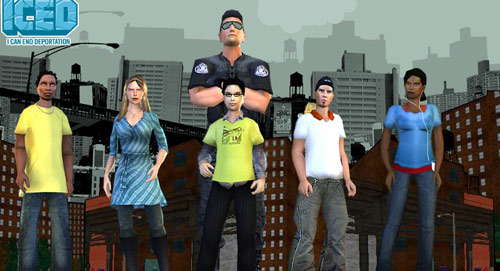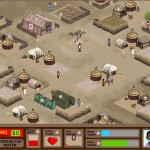Serious Games: Prelude
As part of my preparation for the imminent Games for Change festival here in NYC, I’ve compiled a list of serious games.
And I’m also participating in the 101 Workshop. Because I’m active like that. I’ll first discuss some cool examples of serious games, or whatever you want to call them, and then share some thoughts.
“The object of the game is to become a citizen of the United States.” Focused on “unfair immigration laws,” this game puts you in the shoes of an immigrant teen, trying to navigate your way through the naturalization process.

Available for both PC and Mac (excellent), the download client is free and only 82MB. I played through the game as ‘Anna,’ a Polish immigrant who lost her parents at age 14, got busted for smoking weed, and then, after serving time, was mangled for three years by the immigration system. I wholeheartedly support this game because it I’m not entirely sure whether presenting this information as a game really makes it all that more relevant, besides perhaps getting some headlines.
Overall game play is pretty lame: you basically run around in this mid-90s environment, moving from icon to icon to hear tidbits about immigration problems. I really tried to not run into a police officer, but despite my enormous amount of ‘civic’ points — accumulated by tutoring for free and recycling soda cans — I was sent straight to a detention camp. So I suppose that’s their message. Life as an immigrant isn’t a game. And you certainly can’t win at it. I can see the ‘why’; I’m not convinced by the ‘how.’ Oh, and besides a cheapo survey, what am I supposed to do afterwards?
A Force More Powerful
Although it is the “first and only interactive teaching tool in the field of nonviolent conflict,” an ideal that I wholeheartedly support, the game costs $19.95.

Seems odd. Backed by the International Center for Nonviolent Conflict. Perhaps its “destined” audience–”activists and leaders of nonviolent resistance and opposition movements”–is expected to first raise the capital to buy themselves a copy. Smells like an old-fashioned arms race to me. More importantly, it brings up the question whether or not there’s an implicit expectation of ‘serious games’ being free. Seriously, should they be? (Imagine: “Martin Luther King speaking tonight. Buy your tickets here.”)
Re-Mission
Published by HopeLab (developer Realtime Associates), Re-Mission seeks to be “informative and entertaining” for young people with cancer. (Hey you, stop playing and learning! You don’t have cancer.)

Anyway, it’s your average 3rd person shooter in which you fight specific cancers on a cellular level (meaning: inside the body). According to this incomprehensible study, the game does seem to have a positive effect on patients’ understanding of illness and treatment, and sense of “self-efficacy.” I’m not so sure about the suggestion that gamers
maintained higher blood levels of chemotherapy and showed higher rates of antibiotic utilization, both suggesting that Re-Mission helps patients adhere to cancer therapy regimens.
But what the heck. Good for them. What bothers me is HopeLab’s singular focus on “pressing issues and diseases facing young people.” Apparently, “obesity, sickle cell disease, major depressive disorder, and autism” are next. (ny1news) So far: 110,000 distributed copies in 78 countries.
Food Force
Designed and produced by Deepend (Italy) and Playerthree (UK) and paid for by the United Nations’ World Food Programme, Food Force speaks to the difficulties of providing aid in those regions of the world that need it.

In this NYTimes article it reads that FF was downloaded 4 million times in 2006, so that number is probably higher today. The client can be downloaded from Yahoo for both PC (227MB) and Mac (198MB).
I’m becoming increasingly skeptical with this disproportionate focus on young people. What, so grown-ups don’t need to know? Or they get their information elsewhere? What’s the deal?
Peacemaker
With its subtitle: “Play the News. Solve the Puzzle,” the makers behind this game take on the conflict between Israel and Palestine.
Their site lists a truckload of comments that talk about a “satisfying game experience” and how the game teaches you more about this persistent calamity in a few hours than years of merely watching the news.
Available on both Mac and PC, the game can be ordered from Amazon or downloaded directly (250MB). The “winning state is a two-state solution” which tells me that the inspiration of this game was to remedy the problem and not celebrate it in intense detail, like most war-related games. This I consider a positive thing. Moreover, even if the game’s $19.95 price tag is beyond your budget, then I’m excited to note it as a voice out there that promotes a solution.
Darfus is Dying (MTVu)
Its opening screen reads: “Help Stop the Crisis in Darfur. Start Your Experience.” Which, honestly, instills a sense of idiocy in me.
The suggestion “The world is burning. We’re all doomed. Click here,” just misses something. Game play boils down to a frustrating routine of daily activities, communicating, of course, that some people risk their lives just to feed their family. The high production values do take away from it, because it I’m not entirely convinced that these camps in Darfur are organized as neatly. Nonetheless, it’s free and browser-based. Accessibility good.
Three preliminary observations.
1. Serious games should represent a ‘serious’ topic both in game play mechanics and representations. Or, zippy graphics at once confront us with and obfuscate the reality of circumstances beyond our regular life world. While the underlying dynamic makes a solid argument, the visual representation may erroneously suggest that such predicaments are orderly and therefore prone to easy and quick resolution. Not so. Sure, a clean, icon-based game environment facilitates an underlying communique. But the realities to which these games seek to speak are far less clean and wholesome than presented here. This has to be part of it.
2. Serious games should be free. The whole idea of having to pay to learn about non-violent, life-threatening diseases or geo-political conflict is, by definition, antithetical to the agenda of positive worldly change. Universal values are just that: universal. I understand that things cost money, but with the current focus on game design and development, it has to be possible to produce a worthwhile game for free that is not the sole labor of a single grad student. I fully support all the developers aiming to create positive change, but I insist that it is free.
3. Serious games should be easily available. If a serious game is going to inform me of anything, or perhaps even change my mind, then it needs to be right there for me to click on. Advertising, after all, is always free and pervasive. Serendipity — accidentally running into a cool looking game that has an underlying message — is the strongest ally. We cannot engage in the ideas that we do not know about. Making those ideas ubiquitous, and not hidden behind a DVD-ordering arrangement, increases the odds of them being picked up and contributing to positive change. So, my vote goes to browser-based or digitally downloadable games.
One of the questions I’d like to answer is: what does an appropriate organizational model to produce free, serious games that are available for digital download look like?
[I'll write up a part II after the workshop next week.]


